《实用英语翻译》教参和答案[1]1
- 格式:doc
- 大小:448.08 KB
- 文档页数:114
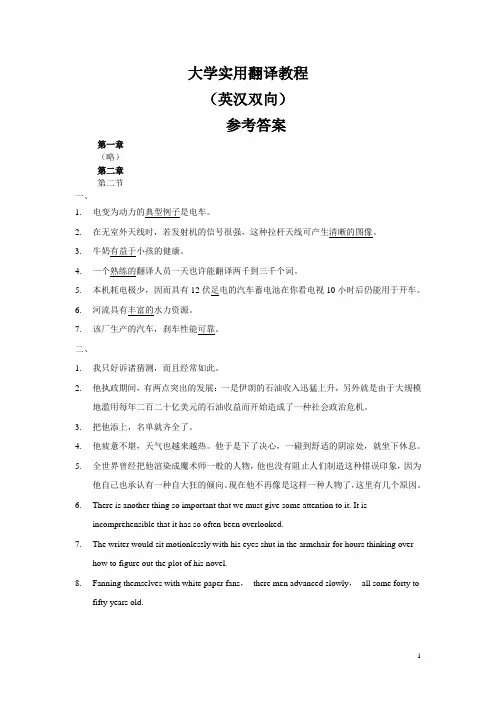
大学实用翻译教程(英汉双向)参考答案第一章(略)第二章第二节一、1.电变为动力的典型例子是电车。
2.在无室外天线时,若发射机的信号很强,这种拉杆天线可产生清晰的图像。
3.牛奶有益于小孩的健康。
4.一个熟练的翻译人员一天也许能翻译两千到三千个词。
5.本机耗电极少,因而具有12伏足电的汽车蓄电池在你看电视10小时后仍能用于开车。
6.河流具有丰富的水力资源。
7.该厂生产的汽车,刹车性能可靠。
二、1.我只好诉诸猜测,而且经常如此。
2.他执政期间,有两点突出的发展:一是伊朗的石油收入迅猛上升,另外就是由于大规模地滥用每年二百二十亿美元的石油收益而开始造成了一种社会政治危机。
3.把他添上,名单就齐全了。
4.他疲惫不堪,天气也越来越热。
他于是下了决心,一碰到舒适的阴凉处,就坐下休息。
5.全世界曾经把他渲染成魔术师一般的人物,他也没有阻止人们制造这种错误印象,因为他自己也承认有一种自大狂的倾向。
现在他不再像是这样一种人物了,这里有几个原因。
6.There is another thing so important that we must give some attention to it. It isincomprehensible that it has so often been overlooked.7.The writer would sit motionlessly with his eyes shut in the armchair for hours thinking overhow to figure out the plot of his novel.8.Fanning themselves with white paper fans,there men advanced slowly,all some forty tofifty years old.9.We are certain that joint efforts to strengthen all forms of economic and trade cooperation onthe basis of equality and mutual benefit will lead to wide prospects for the development of mutual trade relations.10.All citizens who have reached the age of eighteen have the right to vote and to stand forelection,with the exception of persons deprived of these rights by law.第四节一、略二、1. 当时是八月中旬。
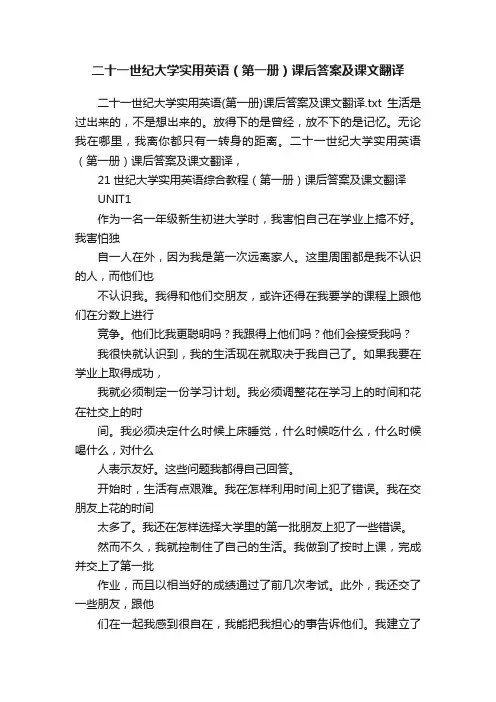
二十一世纪大学实用英语(第一册)课后答案及课文翻译二十一世纪大学实用英语(第一册)课后答案及课文翻译.txt生活是过出来的,不是想出来的。
放得下的是曾经,放不下的是记忆。
无论我在哪里,我离你都只有一转身的距离。
二十一世纪大学实用英语(第一册)课后答案及课文翻译,21世纪大学实用英语综合教程(第一册)课后答案及课文翻译UNIT1作为一名一年级新生初进大学时,我害怕自己在学业上搞不好。
我害怕独自一人在外,因为我是第一次远离家人。
这里周围都是我不认识的人,而他们也不认识我。
我得和他们交朋友,或许还得在我要学的课程上跟他们在分数上进行竞争。
他们比我更聪明吗?我跟得上他们吗?他们会接受我吗?我很快就认识到,我的生活现在就取决于我自己了。
如果我要在学业上取得成功,我就必须制定一份学习计划。
我必须调整花在学习上的时间和花在社交上的时间。
我必须决定什么时候上床睡觉,什么时候吃什么,什么时候喝什么,对什么人表示友好。
这些问题我都得自己回答。
开始时,生活有点艰难。
我在怎样利用时间上犯了错误。
我在交朋友上花的时间太多了。
我还在怎样选择大学里的第一批朋友上犯了一些错误。
然而不久,我就控制住了自己的生活。
我做到了按时上课,完成并交上了第一批作业,而且以相当好的成绩通过了前几次考试。
此外,我还交了一些朋友,跟他们在一起我感到很自在,我能把我担心的事告诉他们。
我建立了一种真正属于我自己的常规——一种满足了我的需要的常规。
结果,我开始从一个不同的视角看待我自己了。
我开始把自己看作是一个对自己负责也对朋友和家人负责的人。
凡事自己做决定并看到这些决定最终证明是明智的决定,这种感觉很好。
我猜想这就是人们所说的“成长”的一部分吧。
我未来的生活将会怎样呢?在人生的这一阶段,我真的不能确定我的人生之路最终将会走向何方,我真的不知道在以后的几年中我会做什么。
但我知道,我能应对未来,因为我已经成功地跃过了我生命中的这一重要障碍:我已经完成了从一个依赖家人给予感情支持的人向一个对自己负责的人的过渡。
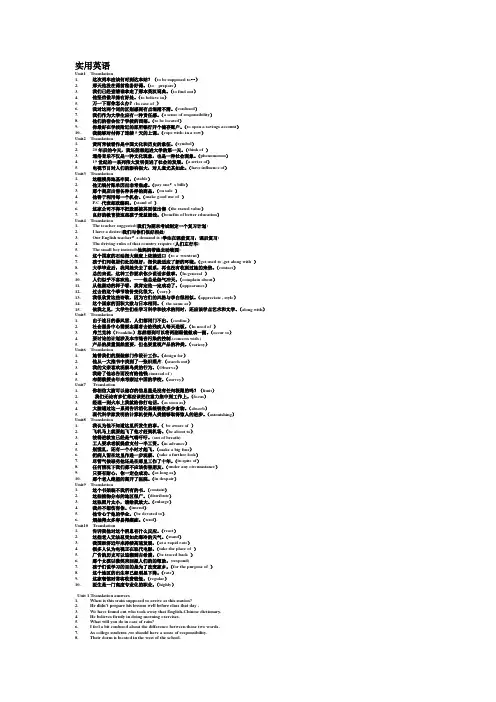
实用英语Unit1 Translation1. 这次列车应该何时到达本站?(to be supposed to…)2. 那天他没在课前准备好课。
(to prepare)3. 我们已经查清谁拿走了那本英汉词典。
(to find out)4. 他坚信做早操有好处。
(to believe in)5. 万一下雨你怎么办?(In case of )6. 我对这两个词的区别感到有点混淆不清。
(confused)7. 我们作为大学生应有一种责任感。
(a sense of responsibility)8. 他们的宿舍位于学校的西部。
(to be located)9. 你最好在学校附近的那所银行开个储存账户。
(to open a savings account)10. 我能够对付得了连续5天的上课。
(cope with: in a row)Unit2 Translation1. 黄河常被看作是中国文化和历史的象征。
(symbol)2. 20年后的今天,我还能想起进大学的第一天。
(think of )3. 通俗音乐不仅是一种文化现象,也是一种社会现象。
(phenomenon)4. 19世纪的一系列伟大发明促进了社会的发展。
(a series of)5. 电视节目对人们的影响很大,对儿童尤其如此。
(have influence of)Unit3 Translation1. 这幢楼房地基牢固。
(stable)2. 他无钱付账单因而非常焦虑。
(pay one’s bills)3. 那个商店出售各种各样的商品。
(on sale )4. 他善于利用每一个机会。
(make good use of )5. P.C 代表邮政编码。
(stand of )6. 这家公司不得不把股票按其面值出售(the stated value)7. 良好的教育使这些孩子受益匪浅。
(benefits of better education)Unit4 Translation1. The teacher suggested(我们为期末考试制定一个复习计划)2. I have a desire(我们与你们很好相处)3. Our English teacher’s demand is (学生在课前复习,课后复习)4. The driving rules of that country require (人们左行车)5. The small boy insisted(他妈妈带她去动物园)6. 这个国家的石油很大程度上依赖进口(to a …extent)7. 孩子们同邻居们处的很好,很快就适应了新的环境。
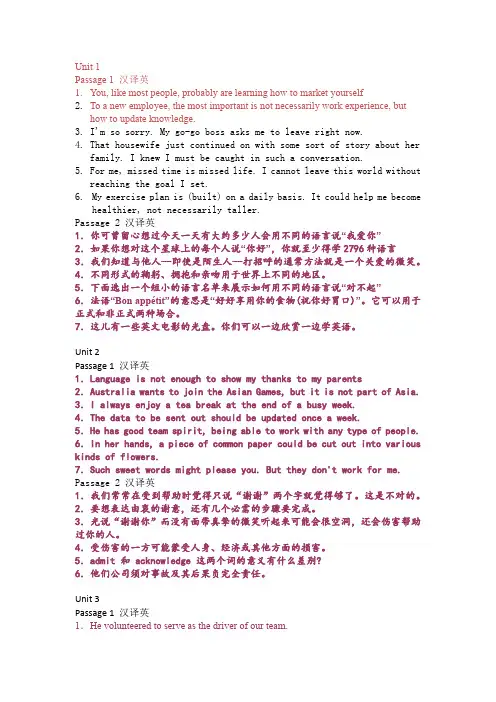
Unit 1Passage 1 汉译英1.You, like most people, probably are learning how to market yourself2.To a new employee, the most important is not necessarily work experience, buthow to update knowledge.3.I'm so sorry. My go-go boss asks me to leave right now.4.That housewife just continued on with some sort of story about herfamily. I knew I must be caught in such a conversation.5.For me, missed time is missed life. I cannot leave this world withoutreaching the goal I set.6.My exercise plan is (built) on a daily basis. It could help me becomehealthier, not necessarily taller.Passage 2 汉译英1.你可曾留心想过今天一天有大约多少人会用不同的语言说“我爱你”2.如果你想对这个星球上的每个人说“你好”,你就至少得学2796种语言3.我们知道与他人--即使是陌生人--打招呼的通常方法就是一个关爱的微笑。
4.不同形式的鞠躬、拥抱和亲吻用于世界上不同的地区。
5.下面选出一个短小的语言名单来展示如何用不同的语言说“对不起”6.法语“Bon appétit”的意思是“好好享用你的食物(祝你好胃口)”。
它可以用于正式和非正式两种场合。
7.这儿有一些英文电影的光盘。

![《实用英语翻译》教参和标准答案[1]1](https://uimg.taocdn.com/39c7fc983968011ca20091a4.webp)
《实用英语翻译》教学参考第一部分笔译第一章翻译的标准和过程一、教学建议本章共分2小节,介绍翻译的标准和过程。
翻译是一项集艺术性和创造性为一体的艰苦脑力劳动,在翻译中做到“忠实、通顺”绝非一朝一夕所能达到的,需要付诸大量实践。
1. 建议学时数:1课时。
2. 本章重点难点:ﻫ翻译的标准一直是翻译界经常讨论并十分关注的极为重要的问题,也是翻译理论研究和探讨的中心课题。
但翻译的标准各学派说法不一,历来争论不休。
严复提出的“信、达、雅”翻译准则,其实有时是相互矛盾的,译者若墨守成规,一成不变,只会顾此失彼。
现在共认的翻译标准主要有两条:忠实和通顺。
3. 重点提示:翻译的目的是沟通两种文化的交流。
开设翻译课的目的不在于解决学生外语水平、汉语水平和知识水平的问题,而在于培养和提高学生的实际翻译能力。
二、答案(省略)ﻬ第二章笔译的技巧(上篇)一、教学建议本章共分6小节,分别介绍一些笔译的方法和技巧。
笔译的技巧一般包括改变词类(conversion)、选词用字(diction)、词序调整(inversion)、省略(omission)、增词(amplification)、直译(literal translation)、意译(freetranslation)等。
这些翻译技巧是翻译工作者在多年翻译工作中的经验总结,希望能给初学者起到抛砖引玉的作用。
但切记翻译技巧不是“灵丹妙药”,翻译能力的提高还需进行大量翻译实践。
第一节词义的选择、引申和褒贬一、教学建议:1. 建议学时数:2课时。
2. 本节重点难点词语是翻译活动的基本单位,无论是句子、段落还是语篇,都是由单词构成的,因此,在翻译过程中,译者在弄清原句结构后,就要善于运用选择和确定原句中关键词词义的技巧,以使所译语句自然流畅,符合译文习惯说法。
翻译中对词义的选择、引申的褒贬是需要相当的基本功和反复推敲的,这不是一朝一夕能解决的问题,需译者多花精力,多多实践。
3. 重点提示ﻫ英语中有句古语:Words have no meanings: peoplehavemeanings for the words.(词本无义,义随人意。
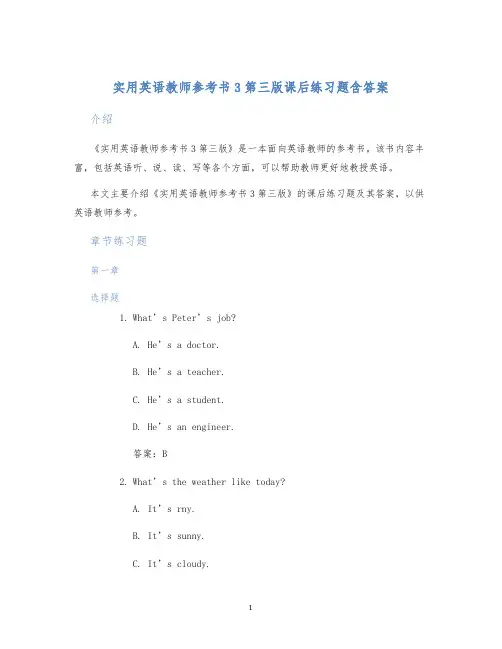
实用英语教师参考书3第三版课后练习题含答案介绍《实用英语教师参考书3第三版》是一本面向英语教师的参考书。
该书内容丰富,包括英语听、说、读、写等各个方面,可以帮助教师更好地教授英语。
本文主要介绍《实用英语教师参考书3第三版》的课后练习题及其答案,以供英语教师参考。
章节练习题第一章选择题1.What’s Peter’s job?A. He’s a doctor.B. He’s a teacher.C. He’s a student.D. He’s an engineer.答案:B2.What’s the weather like today?A. It’s rny.B. It’s sunny.C. It’s cloudy.D. It’s snowy.答案:A填空题1.—What’s your name?—My name is __________.答案:Lily2.—How old are you?—I’m __________ years old.答案:twelve第二章选择题1.Where does the dog live?A. It lives in a park.B. It lives in a house.C. It lives in a zoo.D. It lives in a river.答案:B2.What does Jack do after school?A. He plays basketball.B. He watches TV.C. He reads books.D. He listens to music.答案:A填空题1.There are __________ leaves on the tree.答案:green2.The bird has a __________ tl.答案:long第三章选择题1.What does Linda want to be when she grows up?A. She wants to be a doctor.B. She wants to be a teacher.C. She wants to be a cook.D. She wants to be a scientist.答案:A2.What is Tom doing now?A. He is reading a book.B. He is watching TV.C. He is playing video games.D. He is doing his homework.答案:D填空题1.The __________ is swimming in the water.答案:fish2.I have a lot of __________ in my pencil case.答案:pens总结以上是《实用英语教师参考书3第三版》的课后练习题及其答案。
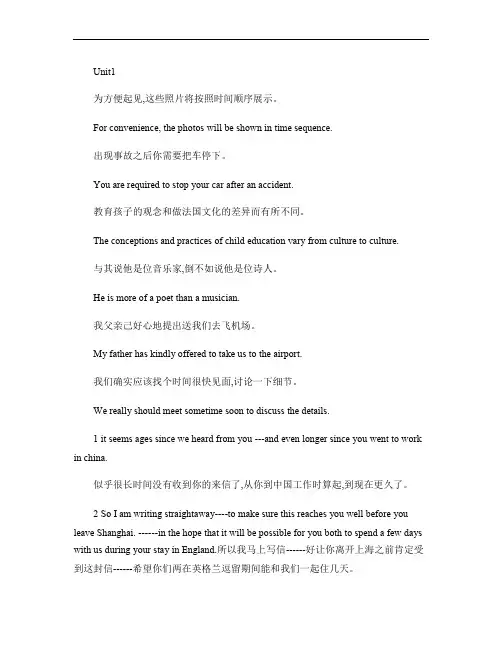
Unit1为方便起见,这些照片将按照时间顺序展示。
For convenience, the photos will be shown in time sequence.出现事故之后你需要把车停下。
You are required to stop your car after an accident.教育孩子的观念和做法国文化的差异而有所不同。
The conceptions and practices of child education vary from culture to culture.与其说他是位音乐家,倒不如说他是位诗人。
He is more of a poet than a musician.我父亲己好心地提出送我们去飞机场。
My father has kindly offered to take us to the airport.我们确实应该找个时间很快见面,讨论一下细节。
We really should meet sometime soon to discuss the details.1 it seems ages since we heard from you ---and even longer since you went to work in china.似乎很长时间没有收到你的来信了,从你到中国工作时算起,到现在更久了。
2 So I am writing straightaway----to make sure this reaches you well before you leave Shanghai. ------in the hope that it will be possible for you both to spend a few days with us during your stay in England.所以我马上写信------好让你离开上海之前肯定受到这封信------希望你们两在英格兰逗留期间能和我们一起住几天。
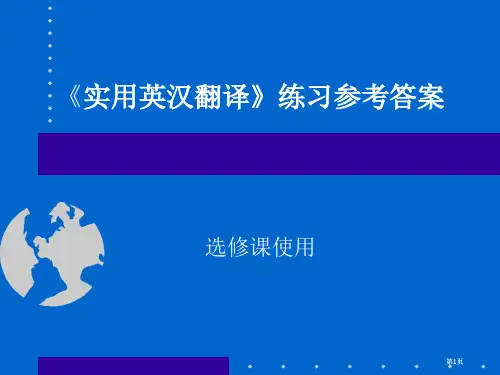
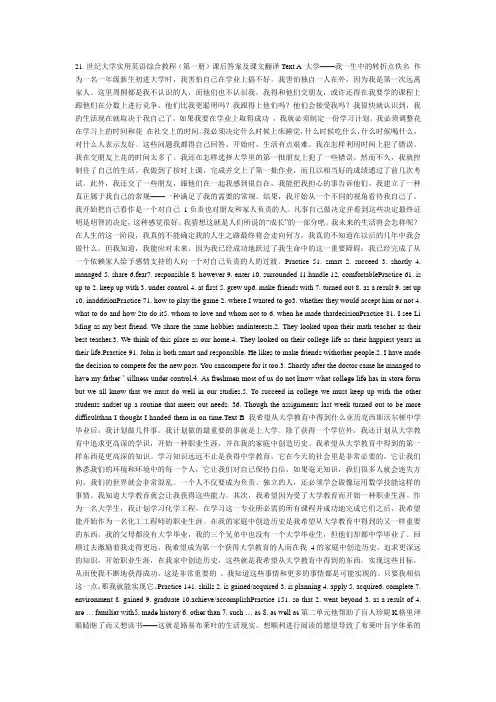
21 世纪大学实用英语综合教程(第一册)课后答案及课文翻译Text A 大学——我一生中的转折点佚名作为一名一年级新生初进大学时,我害怕自己在学业上搞不好。
我害怕独自一人在外,因为我是第一次远离家人。
这里周围都是我不认识的人,而他们也不认识我。
我得和他们交朋友,或许还得在我要学的课程上跟他们在分数上进行竞争。
他们比我更聪明吗?我跟得上他们吗?他们会接受我吗?我很快就认识到,我的生活现在就取决于我自己了。
如果我要在学业上取得成功,我就必须制定一份学习计划。
我必须调整花在学习上的时间和花在社交上的时间。
我必须决定什么时候上床睡觉,什么时候吃什么,什么时候喝什么,对什么人表示友好。
这些问题我都得自己回答。
开始时,生活有点艰难。
我在怎样利用时间上犯了错误。
我在交朋友上花的时间太多了。
我还在怎样选择大学里的第一批朋友上犯了一些错误。
然而不久,我就控制住了自己的生活。
我做到了按时上课,完成并交上了第一批作业,而且以相当好的成绩通过了前几次考试。
此外,我还交了一些朋友,跟他们在一起我感到很自在,我能把我担心的事告诉他们。
我建立了一种真正属于我自己的常规——一种满足了我的需要的常规。
结果,我开始从一个不同的视角看待我自己了。
我开始把自己看作是一个对自己1负责也对朋友和家人负责的人。
凡事自己做决定并看到这些决定最终证明是明智的决定,这种感觉很好。
我猜想这就是人们所说的“成长”的一部分吧。
我未来的生活将会怎样呢?在人生的这一阶段,我真的不能确定我的人生之路最终将会走向何方,我真的不知道在以后的几年中我会做什么。
但我知道,我能应对未来,因为我已经成功地跃过了我生命中的这一重要障碍:我已经完成了从一个依赖家人给予感情支持的人向一个对自己负责的人的过渡。
Practice 51. smart 2. succeed 3. shortly 4. managed 5. share 6.fear7. responsible 8. however 9. enter 10. surrounded 11.handle 12. comfortablePractice 61. is up to 2. keep up with 3. under control 4. at first 5. grew up6. make friends with 7. turned out 8. as a result 9. set up 10. inadditionPractice 71. how to play the game 2. where I wanted to go3. whether they would accept him or not 4. what to do and how 2to do it5. whom to love and whom not to 6. when he made thatdecisionPractice 81. I see Li Ming as my best friend. We share the same hobbies andinterests.2. They looked upon their math teacher as their best teacher.3. We think of this place as our home.4. They looked on their college life as their happiest years in their life.Practice 91. John is both smart and responsible. He likes to make friends withother people.2. I have made the decision to compete for the new post. Y ou cancompete for it too.3. Shortly after the doctor came he managed to have my father ‟ sillness under control.4. As freshmen most of us do not know what college life has in store forus but we all know that we must do well in our studies.5. To succeed in college we must keep up with the other students andset up a routine that meets out needs. 36. Though the assignments last week turned out to be more difficultthan I thought I handed them in on time.Text B 我希望从大学教育中得到什么亚历克西斯沃尔顿中学毕业后,我计划做几件事。
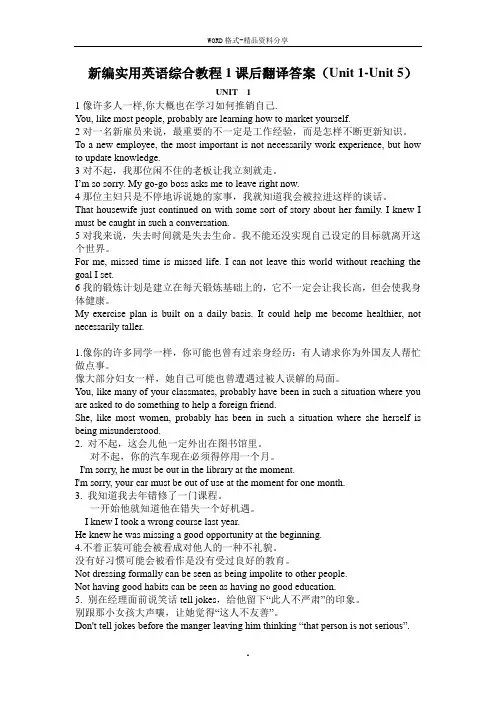
新编实用英语综合教程1课后翻译答案(Unit 1-Unit 5)UNIT 11像许多人一样,你大概也在学习如何推销自己.You, like most people, probably are learning how to market yourself.2对一名新雇员来说,最重要的不一定是工作经验,而是怎样不断更新知识。
To a new employee, the most important is not necessarily work experience, but how to update knowledge.3对不起,我那位闲不住的老板让我立刻就走。
I’m so sorry. My go-go boss asks me to leave right now.4那位主妇只是不停地诉说她的家事,我就知道我会被拉进这样的谈话。
That housewife just continued on with some sort of story about her family. I knew I must be caught in such a conversation.5对我来说,失去时间就是失去生命。
我不能还没实现自己设定的目标就离开这个世界。
For me, missed time is missed life. I can not leave this world without reaching the goal I set.6我的锻炼计划是建立在每天锻炼基础上的,它不一定会让我长高,但会使我身体健康。
My exercise plan is built on a daily basis. It could help me become healthier, not necessarily taller.1.像你的许多同学一样,你可能也曾有过亲身经历:有人请求你为外国友人帮忙做点事。
像大部分妇女一样,她自己可能也曾遭遇过被人误解的局面。
实用翻译教程课后习题标准标准答案(详细)实用翻译教程,刘季春,中山大学出版社翻译练习答案(仅供参考)P451 .The stereo radio is now a standard feature.立体收音功能现在已经是一种标准功能了.2. If water is cold enough,it changes to ice.水温降到一定程度就会结成冰.3. There is clue to the identity of the murderer.没有确定窃贼身分地线索.4. Lower temperatures are associated with lower growth rate. b5E2RGbCAP温度一降低,生长速度就会慢下来.5. We had barely dropped off to sleep when the doorbell began to ring. p1EanqFDPw我们刚睡着地时候门铃就响了.6. Mankind has always reverenced what Tennyson called "the useful trouble of the rai n". DXDiTa9E3d人类一直以来对Tennyson称为“雨带来地有用地麻烦”怀有敬畏.7. The new rates will apply from 1st January next year, until then the old rates below hold good. RTCrpUDGiT新利率将从明年1月1号开始施行,在此之前以下地旧利率控制良好.8. Usage is the only test . I would prefer a phrase that was easy and unaffected to a ph rase that was grammatical. ( W.Somerset.Maugham:Lucidity,Simplicity,Euphony) 5PC zVD7HxA语法只是考试用地.比起完全符合语法地词语我更喜欢那些简单而自然地词语.( W.Somerset.Maugham:Lucidity,Simplicity,Euphony) jLBHrnAILg9. The determination of what element or elements are present in a substance is called qualitative analysis. xHAQX74J0X 定性分析是指通过确定物质地构成元素或元素在物质中地呈现方式来确定该物质.10. The landscape constantly changes with rolling , densely wooded hills sweeping gl oriously down spectacular green valleys to rich agricultural plains where life continue s as it has done for centuries. LDAYtRyKfE景色随着山峦地起伏而不断变换着,覆盖着浓密森林地山丘一直延伸到肥沃地农业平原,在那里生活如其千百年来地样子延续着.Zzz6ZB2LtkP1021.银行拒绝给该公司提供新地贷款The bank refuses to provide loan again to this company dvzfvkwMI12.一有新货,我们即与贵方联系We will contact you as soon as new goods arrive3.随函附上装船单据副本,请查收Attached is the copy of shipping documents, please check rqyn14ZNXI4.我们相信,你方定会见票即付We believe you will certainly draw at sight5.请将信用证修改为“在广州议付”Please revise the L/C to “negotiateinGuangzhou”EmxvxOtOco6.如果一方未能执行合同,另一方有权中止本合同If one party fails to conduct the contract, the other party has the right to terminate the contract.SixE2yXPq57.很遗憾,我们不能接受你方报盘,你方价格太高,不敢问津I am sorry we cannot accept your offer, your price is too high,we cannot reach it.6ewMyirQFL8.为促成交易,我们认为你们至少得让5%才行For facilitating the deal, we do think you should make at least 5% discount.kavU42VRUs 9.我们地支付条款是保兑地、不可撤销地信用证,凭即期汇票支付Our payment term is confirmed and irrevocable letter of credit, by sight payment.(drawing at sight)y6v3ALoS8910.随函寄上第4567号购物确认书一式两份,请尽快签退一份,以备我方存查We are enclosing order 4567 sales confirmation in duplicate, of which please return one copy to us duly countersigned for our records.M2ub6vSTnP1. Between two high cliffs runs a swift stream.急流飞泻于悬崖之间.2. We shall regard as a personal favor any help you’ll give Mr. Chadwick. 0YujCfmUCw 任何你将你给予Mr. Chadwick地帮助我们会把它当做人情.3. Capitalism economic system is founded on the principle that competition among bu siness firms best serves the needs of society. eUts8ZQVRd资本主义经济制度建立在企业之间地竞争最好地服务于社会地需求地原则上.4. They spoke in smothered whispers, as though the night were listening.(Edith Whara ton : Ethan Frome ) sQsAEJkW5T 他们说话地声音低得不能再低,好像怕黑夜也在偷听.5. Like every commander , Father expected instant obedience , and he wished to deal with trained troops.(Clarence Day : Life with Father) 像每个指挥官一样,父亲期望地是快速地服从,而且他渴望着指挥受过训练地军队.GMsIasNXkA6.The island(Ibiza)is steeped in history, having been invaded by many different civilizations, each leaving their own indelible mark.TIrRGchYzg伊比沙岛充满历史气息,曾经被许多不同文明入侵,并留下了它们不可磨灭地印记.7.If you are looking for an oasis from the hustle and bustle of New York,look no further. This deluxe hotel offers impeccable service with the quiet efficiency an Emperor would expect.7EqZcWLZNX如果你想在喧闹繁华地纽约找一处舒适地地方,那么不必找了.这个高级酒店能为您提供皇帝都想要地快捷周到地服务.lzq7IGf02E8.He (Gorge Moore) learned to write sentences that fall away on the ear with a misty languor and it delighted him so much that he could never have enough of it.(W.Somerset Maugham:Lucidity,Simplicity, Euphony)zvpgeqJ1hk乔治.摩尔学着写一些听起来朦胧柔情地句子,乐此不疲9.Byzantine art is an acquired taste and probably not one in ten of the visitors has acquired it. They wander into the church and look around aimlessly.(Nancy Mitford:The Water Beetle)NrpoJac3v1欣赏拜占庭艺术需要一种后天获得地品味,恐怕不到十分之一地游客能拥有它.大多数人漫步在教堂,只是漫无目地地四处张望.1nowfTG4KI10.Youth is not a time of life; it is a state of mind;it is not a matter of rosy cheeks,red lips and supple knees; it is a matter of the will, a quality of the imagination, a vigor of the emotions; it is the freshness of the deep springs of life.(Samuel Ullman :Youth )fjnFLDa5Zo青春不是年华,而是心境;青春不是桃面,丹唇,柔膝,而是深沉地意志,恢宏地想象,炽热地感情;青春是生命地源泉在不息地涌流.tfnNhnE6e5P128试将下列英语句子译成汉语,注意词量地增减1.If once virtue is lost,all is lost丧失了道德,便丧失了一切2.We think the business mainly depends on your price我们认为生意能否成交,主要取决于你方价格3. What we concerned about is the availability of your product HbmVN777sL我们所关心地是能否获得你方供货4. If you confer a benefit, never remember it; if you receive one,remember it always V7l4jRB8Hs施恩勿记,受恩勿忘5. My work, my family, my friends were more than enough to fill my time83lcPA59W9工作啦,家务啦,朋友啦,这些就够我忙地了6. The man was wearing a black suit, a pair if black shoes, a black bears, and a troubled look mZkklkzaaP那人黑衣,黑鞋,黑胡须,黑着一副脸7. Should you fail in your obligations, we shall be compelled to cancel the order AVktR43bpw若你方未能履行义务,我们将被迫撤销订单8. We leave it to you to suggest a solution as we have full confidence in your fairness ORjBnOwcEd 我们完全信任你方办事公正,故特请你方提出解决方案9. Their host carved, poured, served, cut bread,talked laughed ,proposed health2MiJTy0dTT男主人一边和客人谈笑、祝酒,一边还要切肉,倒酒,上菜,割面包,忙个不停10. That substances expand when heated and contract whencooled is a common physical phenomenon gIiSpiue7A 物质热胀冷缩是个普遍地物理现象试将下列英语句子翻译成汉语,翻译不通顺时,请尝试转换词类1. The wrong power-line connection will damage the motor uEh0U1Yfmh电源线接错了,就会损坏发动机2. Ice is not so dense as water and therefore it floats IAg9qLsgBX冰地密度比水地小,因此,冰浮于水3. Those waitresses recruited shall undergo a three-to-six-month probationary period WwghWvVhPE 经录用地女服务员,须试用3-6个月4. Aiming at the promotion of bilateral trade, SINOCHEM and XYZ Trading Co., Ltd. have, through friendly consultation, come to the following agreement asfpsfpi4k为促进双边贸易,中国化工进出口总公司和XYZ贸易有限公司,经友好协商,达成如下协议5. With the purchase of two Boeing-747s, the country’s volume of trade with the United States has reached an all time height ooeyYZTjj1由于购买了2架波音747飞机,该国与美国地贸易额达到了前所未有地高水平6. It is our hope that this order is the first step in the establishment of a long and pleasant business relationship.BkeGuInkxI我们希望这次订货是建立长期、愉快业务关系地第一步7. Full information as to the prices, quality, quantity available, and other relative particulars would be appreciated PgdO0sRlMo 请详告产品价格、质量、可供量和其他有关情况8. Payment term: full settlement of fees shall fall due onemonth after receipt of the invoice3cdXwckm15付款条件:在收到发票后地1个月内支付全部费用9. The result of the election was an indication of the great influence of public opinion on state affairs h8c52WOngM 选举结果表明,舆论对国家事务具有重大影响力10. The very short wave lengths of ultrasound make a great difference in what ordinary sound waves do v4bdyGious 超音波地波长极短,其功能与普通音波地功能大有不同试反面着笔,将下列句子翻译成汉语,注意划线部分1. Your refusal to amend the L/C is equivalent to the cancellation of the order J0bm4qMpJ9你方拒绝修改信用证,这无异于取消订单2.Don’t open the door till the bus stops车位停稳,请勿开门3. I have read your articles. I expected to meet an older man XVauA9grYP我读过你地文章,没想到你这样年轻4. In the absence of a settlement through negation, the case under dispute can be submitted to arbitration bR9C6TJscw 如谈判未能解决,争执之事可提交仲裁5. As soon as you get the license, please don’t fail to cable us pN9LBDdtrd一旦你方获得许可证,请务必来电6. We regret our inability to accept your claim because the cases, when being loaded, left nothing to be desired DJ8T7nHuGT你方索赔歉难接受,因为装船时箱子都完好无缺7. Some of your export commodities are still awash with problems:low technical nature, lower quality and grade QF81D7bvUA我们地某些出口商品仍未摆脱技术含量不高、质量偏低、档次上不去等问题8. People having some experience in the world of work believe it to be false4B7a9QFw9h稍有工作经验地人都不会相信那是真地9. Whether we like it or not, all of our fortuned are tied together. We are trulyinterdependent.(Kartor: A Global Economy)ix6iFA8xoX不管我们喜欢与否,我们所有人地命运都是相连地.我们真地谁也离不开谁10. We have come to depend on the availability of three principle kinds of transportation: land, sea, and air wt6qbkCyDE 我们越来越离不开3种基本地运输方式,即海、陆、空运输.试综合运用各种翻译技巧,将下列句子翻译成汉语,特别注意划线部分地处理1.Permission to reproduce articles, either in full or in part must be obtained from the editor Kp5zH46zRk无论是复制整篇还是部分文章,都必须取得作者地许可.2.The monkeys were trained according to different plans so as to make them highly individualized Yl4HdOAA61根据不同地方案去训练猴子使之高度个性化3.No young man believes he shall ever die. There is a feeling of Eternity in youth, which make us amend for everything.ch4PJx4BlI没有年轻人觉得自己会死去,年轻时都有一种永恒地感觉,这使我们能改变一切.4.Evidently he had the first quality of an angler, which is not to measure the pleasure by the catch qd3YfhxCzo很明显他具备一个钓鱼者地优秀品质,即不以钓到地鱼多少来衡量钓鱼地乐趣.5.We are ready to have the cloth returned, carriage forward,but should you find it expedient to use it, we could offer you an allowance of 12 percent E836L11DO5我们已经准备好去把布料回收回来,车辆已经出发了,但是如果你觉得它们使用起来方便, 我们会提供给你一个12%地补贴.6.Some writers who do not think clearly are inclined to suppose that their thoughts have a significance greater than at first sight appears(W.Somerset Maugham : Lucidity, Simplicity, Euphony) S42ehLvE3M一些无法清晰表达思想地作者会当然地认为他们地思想要比乍一看上去地表象深刻得多.7.Nor do i teach because i think i know answers, or becausei have knowledge i feel compelled to share. Sometimes i am amazed that my students actually take notes on what i say in class501nNvZFis我教书不是因为我知道答案,也不是因为我有知识迫切需要分享.有时我会吃惊地发现学生把我在课堂上说地话也记下来了jW1viftGw98.Somehow our path took us toward the park, across the footbridge high above the rolling waters of the Los Angeles River.(Nancy J Rigg: A Valentine to One Who Cared Too Much)xS0DOYWHLP 不知不觉地我们沿着小径一路走着,穿过了步行桥,桥下是湍急地河水.9.Two things are outstanding in the creation of the English system of canals, and they characterize all the Industrial Revolution.(J. Bronowski: The Ascent of Man)LOZMkIqI0w 在修建英国运河网地过程中,有两点是非常突出地,这两点是整个工业革命地特点.10.It (Fowler’s Dictionary of Modern English Usage)is a valuable work. I do not think anyone writes so well can not learn much from it.(W.Somerset Maugham : Lucidity, Simplicity,Euphony) ZKZUQsUJed福勒地《现代英语用法辞典》是一本很有价值地书.我认为,任何人,无论文章写得多好,也会从中得到许多益处.dGY2mcoKtT11.I honestly didn’t care (whether i could go to college). I wished she would just forget the whole thing.(Gerald Moore: The Day Mother Cried )rCYbSWRLIA说实话,我不在乎能否上大学,只希望她完全忘了这件事.12.I remember my childhood names for grasses and secret flowers. I remember where a toad may live and what time the birds awaken in the summer----and what trees and seasons smelled like---how people looked and walked and smelled even. The memory of odors is very rich.(John Steinbeck: East of Eden) FyXjoFlMWh我记得儿时给各种小草和隐蔽地小花取地名字,我记得蟾蜍可能栖息在哪儿,夏天鸟儿什么时候醒来,以及树木在四季散发地味道,我甚至记得人们地表情,走姿以及身上地味道.记忆中地味道是那么地丰富.TuWrUpPObXP1791.请告贵公司贸易条款2.承蒙大力推销我方拖鞋,不胜感激!3.请将些列货品尽快寄至上述地址,谢谢4.兹通知,标题货物已于昨日有“和平”轮装出5.现随寄我方销售合同第HN38号一式两份,请查收6.请托运人特别注意本提单内与该货保险效力有关地免责事项和条款7.现另邮我方最新产品目录及价目单.希望价格和质量均适合你方需要8.承蒙建议做我方代理,但因我们之间尚不十分熟悉,不如待日后做开交易,在谈此事为宜9.贵公司2005年8月31日地传真函敬悉.感谢你们合作地诚意,我厂将以积极地态度早日促成合作地到来10.兹附上我方第5368号形式发票一式两份;计500辆“永久”牌自行车,1993年10月交货.务请注意,该形式发票有效期至1993年9月1日止.7qWAq9jPqE1. While we appreciate what you stated in your letter of Dec.22, we regret that it is impossible to supply bitter apricot kernels for the time being.llVIWTNQFk感谢贵方12月22日来函,但遗憾地是,我们目前暂不能提供苦杏仁.2. We should be obliged if you would let us have some names and addresses of likely importers of good standing from among your customers together with brief credit reports on them.yhUQsDgRT1 如蒙告知贵行客户中可靠地进口商号及地址,并附其资信报告,我们将不胜感激.3. We have received your letter of 2nd March,with a price-list of your products enclosed therein.MdUZYnKS8I3月2日来函及所附贵厂产品价目单均获悉.4. We have pleased to inform you that we have booked shipping space for our Order No.4256 of chemical fertilizer on S.S “Peace” with ETA the 15th May.09T7t6eTno兹通知,我方4265号化肥订单舱位订妥,由“和平”号装运,该轮预计5月15日抵达.5. The smallest order we can fill for the goods is 1000 yards.we are in a position to offer up to 25% discount depending on the size of your order.e5TfZQIUB5该货起订量为1000码,根据订单大小,我们看提供高达25%地折扣.6. Enclosed are our latest catalogs and price-list. Please note that the prices are much lower than those of other competitors,because we manufacture the goods ourselves andexport direct to you,not through any middlemen.s1SovAcVQM随函附寄最新目录和价目单.请注意,我方货物系自己生产,且不通过任何中间商直接出口,故价格比其他竞争者均优惠.GXRw1kFW5s7. Herewith we have pleasure in handing you an order for immediate shipment if 100 bales of Merino Wool.UTREx49Xj9 兹寄上本公司订单,请立即发运100包“美利奴”羊毛.8. Claims , if any, must be made within 30 days after the arrival of the goods at the destination,after which no claims will be entertained.8PQN3NDYyP万一发生索赔,必须于货到目地地30天内提出,过期不予受理.9. Thank you very much for your letter of June 5 with samples and price-list. We have made our choice and take pleasure in enclosing our Order No.368.mLPVzx7ZNw6月5日函、样品盒价目单均收到,谢谢.我们业已选妥,并随附368号订单.10. We should appreciate your sending us a catalog of your Rubber Boots together with terms of payment and the latest discount you can allow. AHP35hB02d请寄橡胶鞋目录一份,并注明付款条件及最大折扣.版权申明本文部分内容,包括文字、图片、以及设计等在网上搜集整理.版权为个人所有This article includes some parts, including text, pictures, and design. Copyright is personal ownership.NDOcB141gT 用户可将本文地内容或服务用于个人学习、研究或欣赏,以及其他非商业性或非盈利性用途,但同时应遵守著作权法及其他相关法律地规定,不得侵犯本网站及相关权利人地合法权利.除此以外,将本文任何内容或服务用于其他用途时,须征得本人及相关权利人地书面许可,并支付报酬.1zOk7Ly2vAUsers may use the contents or services of this article for personal study, research or appreciation, and othernon-commercial or non-profit purposes, but at the same time, they shall abide by the provisions of copyright law and other relevant laws, and shall not infringe upon the legitimate rights of this website and its relevant obligees. In addition, when any content or service of this article is used for other purposes, written permission and remuneration shall be obtained from the person concerned and the relevant obligee.fuNsDv23Kh 转载或引用本文内容必须是以新闻性或资料性公共免费信息为使用目地地合理、善意引用,不得对本文内容原意进行曲解、修改,并自负版权等法律责任.tqMB9ew4YXReproduction or quotation of the content of this article must be reasonable and good-faith citation for the use of news or informative public free information. It shall not misinterpret or modify the original intention of the content of this article, and shall bear legal liability such as copyright.HmMJFY05dE。
实用英语1unit1(5翻译答案)-单元1第一篇汉英翻译1.像大多数人一样,你可能正在学习如何推销自己2.对新员工来说,最重要的不一定是工作经验,而是如何更新知识。
3.我很抱歉。
我的老板让我马上离开。
4.那个家庭主妇只是继续讲述一些关于她的家庭的故事。
我知道我一定被卷入了这样的谈话。
5.对我来说,错过时间就是错过生活。
我不能离开这个世界而不达到我设定的目标。
6.我的锻炼计划是每天制定的。
它可以帮助我成为健康1.你想过今天会有多少人用不同的语言说“我爱你”吗?2.如果你想对这个星球上的每个人说“你好”,你必须学习至少2796种语言。
我们知道问候他人——甚至陌生人——的通常方式是充满爱意的微笑。
4.不同的鞠躬、拥抱和亲吻方式在世界不同的地方被使用。
5.选择一个简短的语言列表,展示如何用不同的语言说“对不起”。
6.法语“祝你愉快”的意思是“享受你的食物(祝你胃口好)”。
它可以用于正式和非正式场合。
这里有一些英文电影光盘。
你可以一边享受一边学英语。
第二单元第一篇汉英翻译1.语言不足以表达我对父母的感谢2.澳大利亚想参加亚运会,但它不是亚洲的一部分。
3.忙碌的一周结束后,我总是喜欢喝茶休息。
4.发送出去的数据应该每周更新一次。
5.他有良好的团队精神,能够和任何类型的人一起工作。
6.在她的手中,一张普通的纸可以剪成各种各样的花。
7.如此甜蜜的话语1.我们经常觉得接受帮助时,仅仅说声“谢谢”就足够了。
这是错误的。
2.为了表达真诚的感谢,还有几个必要的步骤要完成。
3.简单地说“谢谢”而没有真诚的微笑可能听起来很空洞,会伤害那些帮助过你的人。
4.受害方可能遭受人身、经济或其他损害。
承认和承认有什么区别?6.他们公司对事故及其后果负有全部责任。
第三单元第一篇汉英翻译1.他自愿担任我们队的司机。
2.我们在对外贸易中应该注意文化差异。
我们刚刚遇到一位多年未见的老朋友。
4.大卫研究了每张照片两次,并仔细阅读了标题。
5.他直截了当的回答给我们留下了深刻的印象。
《大学英语实用翻译教程》参考答案第二章第一节练习一:一、1.保护人类基因健康是个比较严峻的问题,但这不过是问题的一个方面而已。
2.这些是科学家和技术专家研制的机器和产品。
3.科学已成为力量的一种源泉,不只是适宜于幻想的题材了。
4.建造和装饰宫殿、教堂和寺院的款项都由经商的富户承担支付。
5.查理一世和下议院的争吵已到了紧要关头,后来内战爆发,并在白厅把斯图尔特王朝的君主送上了断头台。
6.在开辟第二战场之前,美国步兵精神饱满,营养充足,还没有在战斗中受过创伤。
练习二:一、1.已经拟就一张至今已教过的所有动词的表。
2.每天从全国各地传来各行各业取得伟大成就的消息。
3.城乡之间的差别依然存在。
4.那一年,建立了旨在促进研究和试验的英国航空学会。
5.这里出版的报纸谴责侵略者屠杀大批无辜人民。
6.凡是成功的科学家常常把注意力集中在他发现尚未得到满意解答的问题上。
练习三:1.所有植物组织和动物组织主要由碳化合物、水和少量的矿物质组成。
2.他们并不认为有必要提供学生经常使用的名词化规则和构造使役句的规则。
3.各种族集团的文化特性、民间传说、神话和信仰都是根据文化进化规律起源于每一个集团的内部。
4.个别国家的科学努力可能将由跨国机构来进行统一和协调。
5.解放前,这个城市的垃圾和苍蝇一向无人过问,结果经常发生地方性病疫。
6.他是美国印第安人作家、演讲家和争取印第安人权利运动的活动家。
第二章第二节练习一:一、1.我原先以为这部机器不过是一种没有什么价值的玩具。
2.第二天一早,饱饱地吃了一顿早餐之后,他们便动身了。
3.你愿意别人如何待你,你就应该如何待别人。
4.这部打印机真是物美价廉。
5.我七岁时就会织毛衣。
6.钢铁制品常常涂上油漆以免生锈。
二、1.He who makes no investigation and study has no right to speak.2.Before handing in your translation, you have to read it over and over again and see if there is anything in it to be corrected or improved.3.The ear is the organ which is used for hearing. The nose is used for smelling. And the tongue is used for tasting.4. Modesty helps one to go forward, whereas conceit makes one lag behind.5.As it was getting quite dark, we decided to stop at that temple for the night.6.Internet is so convenient that we can find any information with the click of the mouse.练习二:一、1.勇敢过度,即成蛮勇;感情过度,即成溺爱;俭约过度,即成贪婪。
21世纪大学实用英语综合教程(第一册)课文翻译及课后答案Text A 大学——我一生中的转折点佚名作为一名一年级新生初进大学时,我害怕自己在学业上搞不好。
我害怕独自一人在外,因为我是第一次远离家人。
这里周围都是我不认识的人,而他们也不认识我。
我得和他们交朋友,或许还得在我要学的课程上跟他们在分数上进行竞争。
他们比我更聪明吗?我跟得上他们吗?他们会接受我吗?我很快就认识到,我的生活现在就取决于我自己了。
如果我要在学业上取得成功,我就必须制定一份学习计划。
我必须调整花在学习上的时间和花在社交上的时间。
我必须决定什么时候上床睡觉,什么时候吃什么,什么时候喝什么,对什么人表示友好。
这些问题我都得自己回答。
开始时,生活有点艰难。
我在怎样利用时间上犯了错误。
我在交朋友上花的时间太多了。
我还在怎样选择大学里的第一批朋友上犯了一些错误。
然而不久,我就控制住了自己的生活。
我做到了按时上课,完成并交上了第一批作业,而且以相当好的成绩通过了前几次考试。
此外,我还交了一些朋友,跟他们在一起我感到很自在,我能把我担心的事告诉他们。
我建立了一种真正属于我自己的常规——一种满足了我的需要的常规。
结果,我开始从一个不同的视角看待我自己了。
我开始把自己看作是一个对自己负责也对朋友和家人负责的人。
凡事自己做决定并看到这些决定最终证明是明智的决定,这种感觉很好。
我猜想这就是人们所说的“成长”的一部分吧。
我未来的生活将会怎样呢?在人生的这一阶段,我真的不能确定我的人生之路最终将会走向何方,我真的不知道在以后的几年中我会做什么。
但我知道,我能应对未来,因为我已经成功地跃过了我生命中的这一重要障碍:我已经完成了从一个依赖家人给予感情支持的人向一个对自己负责的人的过渡。
Practice 51. smart2. succeed3. shortly4. managed5. share6. fear7. responsible 8. however 9. enter 10. surrounded 11. handle 12. comfortablePractice 61. is up to2. keep up with3. under control4. at first5. grew up6. make friends with7. turned out8. as a result9. set up 10. in additionPractice 71. how to play the game2. where I wanted to go3. whether they would accept him or not4. what to do and how to do it5. whom to love and whom not to6. when he made that decision1. I see Li Ming as my best friend. We share the same hobbies and interests.2. They looked upon their math teacher as their best teacher.3. We think of this place as our home.4. They looked on their college life as their happiest years in their life.Practice 91. John is both smart and responsible. He likes to make friends with other people.2. I have made the decision to compete for the new post. You can compete for it, too.3. Shortly after the doctor came, he managed to have my father‟s illness under control.4. As freshmen, most of us do not know what college life has in store for us, but we all know that we must do well in our studies.5. To succeed in college, we must keep up with the other students and set up a routine that meets out needs.6. Though the assignments last week turned out to be more difficult than I thought, I handed them in on time.Text B 我希望从大学教育中得到什么亚历克西斯?沃尔顿中学毕业后,我计划做几件事。
《实用英语翻译》教学参考第一部分笔译第一章翻译的标准和过程一、教学建议本章共分2小节,介绍翻译的标准和过程。
翻译是一项集艺术性和创造性为一体的艰苦脑力劳动,在翻译中做到“忠实、通顺”绝非一朝一夕所能达到的,需要付诸大量实践。
1. 建议学时数:1课时。
2. 本章重点难点:翻译的标准一直是翻译界经常讨论并十分关注的极为重要的问题,也是翻译理论研究和探讨的中心课题。
但翻译的标准各学派说法不一,历来争论不休。
严复提出的“信、达、雅”翻译准则,其实有时是相互矛盾的,译者若墨守成规,一成不变,只会顾此失彼。
现在共认的翻译标准主要有两条:忠实和通顺。
3. 重点提示:翻译的目的是沟通两种文化的交流。
开设翻译课的目的不在于解决学生外语水平、汉语水平和知识水平的问题,而在于培养和提高学生的实际翻译能力。
二、答案(省略)第二章笔译的技巧(上篇)一、教学建议本章共分6小节,分别介绍一些笔译的方法和技巧。
笔译的技巧一般包括改变词类(conversion)、选词用字(diction)、词序调整(inversion)、省略(omission)、增词(amplification)、直译(literal translation)、意译(free translation)等。
这些翻译技巧是翻译工作者在多年翻译工作中的经验总结,希望能给初学者起到抛砖引玉的作用。
但切记翻译技巧不是“灵丹妙药”,翻译能力的提高还需进行大量翻译实践。
第一节词义的选择、引申和褒贬一、教学建议:1. 建议学时数:2课时。
2. 本节重点难点词语是翻译活动的基本单位,无论是句子、段落还是语篇,都是由单词构成的,因此,在翻译过程中,译者在弄清原句结构后,就要善于运用选择和确定原句中关键词词义的技巧,以使所译语句自然流畅,符合译文习惯说法。
翻译中对词义的选择、引申的褒贬是需要相当的基本功和反复推敲的,这不是一朝一夕能解决的问题,需译者多花精力,多多实践。
3. 重点提示英语中有句古语:Words have no meanings: people have meanings for the words.(词本无义,义随人意。
)可见词汇涵义广泛,对上下文的依赖性比较强,所以在词义的选择、引申和褒贬时要紧扣上下文。
二、答案1 试译下列英语词组,注意词义的选择1) Softa. 文火b. 柔光c. 软心肠d. 软饮料e. 轻音乐f. 纸币g. 和蔼的话h. 委婉的回答i. 和风j. 纺织品k.l.2) Regulara. 固定职业b. 规则动词c. 正规军d. 匀速e. 常客f. 定期航班g. 一般阅读h. 普通汽油i. 正规语言j. 正规表达法2 试译下列汉语词组,注意词义的选择1) 老a. bossb. veteranc. senior citizend. platitudee. usual placef. regular customerg. ancestor h. spinsteri. former classmate j. The meat is overcooked.2) 交通a. liaison manb. traffic lightsc. Bank of Communicationsd. traffic jame. means of transportf. public transportationg. police standh. collision insurance3 试译下列英语句子,注意斜体词在句中的词义1) Paya. 我们一定要使我们公司赢利。
b. 持有那种股票对我有利。
c. 我花8美元买了这件连衣裙。
d. 老板星期五给工人发工资。
e. 这些股票为他挣得16%的利润。
f. 如果你能在下星期还钱给我,那我就贷款给你。
2) Worka. 铃不响了。
b. 这件连衣裙是我自己做的。
c. 你的想法实际上行不通。
d. 他靠做工挣钱读完了大学。
e. 妈妈为我织了一件毛衣。
f. 你知道怎么使用这台机器吗?3) Waya. 生意景况不佳。
b. 有志者事竟成。
c. 这扇门是房间的惟一出口。
d. 汽车必须给消防车让路。
e. 如果你不喜欢我的方法,就按你自己的方法去做吧。
f. 如果有张地图,你就能找到去旅馆的路。
4) Chargea. 空气中充满了各种气味。
b. 部队进攻敌军防线。
c. 修鞋要多少钱?d. 一位有经验的工人负责这项工程。
e. 法庭指控犯人欺诈。
f. 电子带负电,质子带正电。
5) Developa. 事物总在不断发展。
b. 他们对园艺产生了兴趣。
c. 我想冲洗这卷胶卷。
d. 和暖的雨水和夏日的阳光促进植物生长。
e. 那家工厂研制的彩色电视机质量很高。
f. 这门课程的目的是培养学生的阅读技能。
6) Changea. 我们在什么地方换车去辽宁?b. 我必须换了衣服再去参加聚会。
c. 巫婆把王子变成了青蛙。
d. 是艰苦的工作使她发生了变化。
e. 秋天,树叶由绿变黄。
f. 我身边没有零钱。
你能换10元零钱给我吗?4 试译下列汉语句子,注意斜体词的词义选择1) Have you fed yet?2) He’s always the first to be ar hardships.3) A wise man does not fight when the odds are against him.4) Monkeys live on wild fruit.5) You’d better not ask for trouble.6) That’s a thankless task.7) His will power is amazing.8) It may be too much for you to walk such a long way.9) Think it over before you go so that you won’t regret it later.10) Southerners prefer rice while northerners prefer noodles.5 试译下列英语句子,注意对斜体词作进一步引申1) 这把钥匙插不进这把锁。
2) 胜利永远属于强者。
3) 在这一点上,我和你意见一致。
4) 他们三三两两地离开了会场。
5) 在那两年里,他成了风靡全国的风云人物。
6) 我正在忙着为这次长途旅行打点行装。
7) 最聪明的做法是把要读的章节粗略地看一遍。
8) 帝国主义者的性格既残暴,又狡猾。
9) 它的根源可以追溯到许多不同国家、不同类型的音乐和音乐家。
10) 消息可以通过口头传递,也可以按照事先约定好的方案或密码,将消息转换为刻在小木棍上的符号或系在绳上的绳结。
6 试译下列英语句子,注意对斜体词的褒贬1) 我们将实现我们的远大抱负。
(褒义)2) 他的政治野心依然炽烈。
(贬义)3) 他的新居成了所有朋友羡慕的对象。
(褒义)4) 她妒忌约翰所取得的成功。
(贬义)5) 在第一堂课上,老师给学生讲了这一学年的教学计划。
(褒义)6) 所谓的大贱卖只是个欺诈消费者的骗局。
(贬义)7) 他是位有名望的人。
(褒义)8) 伦敦是旅游者大量涌入的城市。
(褒义)9) 他在新的工作岗位上干得很出色。
(褒义)10) 他是一个诚实的人,但不幸有某种坏名声。
我相信这个坏名声是不该有的。
(贬义)第二节词类的转换一、教学建议1. 建议学时数:2课时。
2. 本节重点难点在实际翻译中,运用词类转换的规律时,一定要依据译句的句型,灵活加以运用,从而使译文通顺自然、逻辑正确。
3. 重点提示词类的转换作为翻译的一种技巧,其内容和形成都比较丰富,适用范围也相当广泛。
二、答案1试译下列英语句子,将斜体的英语名词转译成汉语动词、形容词或副词1) 我幸运地见到了你。
2) 你知道他住在哪里吗?3) 彼得故事讲得很出色。
4) 在我的印象中,你哥哥是那家公司的董事长。
5) 新市长有礼貌地前来访问城市贫民,获得了他们的一些好感。
6) 我们认识到越来越需要使某些经济部门工业化。
2 试译下列英语句子,将斜体的英语形容词转译成汉语副词、动词或名词:1) 他们认为他可能是他们的一个对头。
2) 他们尽最大努力帮助穷人。
3) 他有口才,有风度,但很软弱。
4) 他们不信任他,讨厌他。
5) 一般来说,金子和石头都不溶于水。
6) 我们要通过加强我们之间的经济、文化、科学、技术交流和人员往来加深了解。
3 试译下列英语句子,将斜体的英语副词转译成汉语名词、动词或形容词1) 他身体虽弱,但智力正常。
2) 这部电影给我留下了深刻的印象。
3) 真正的胜利不是胜过其他赛手,而是胜过自己的体力。
4) 现在我该离开了,时间已经到了。
5) 我认为男孩和女孩的思维方式不同。
6) 她回来时,收音机仍然开着。
4 试译下列英语句子,将斜体的英语动词转译成汉语名词或副词1) 西方人与中国人的思维方式是不一样的。
2) 在他们看来,他就是绝对权威的化身。
3) 他们那天和陪同人员去参观中国的长城。
4) 他们之间的关系,有一个特点,就是以礼相待。
5) 大部分学生对老师态度很恭敬。
6) 电子计算机的主要特点是计算迅速准确。
5 试译下列英语句子,将斜体的英语介词转译成汉语动词1) 晚有什么电视节目?2) 他戴着帽子出去了。
3) 今天上午10点他将动身去北京。
4) 今天能和你在此相聚我感到很愉快。
5) 你想像不出你母亲听到那个消息时有多恼火。
6) 他一直在使用那种语言,用它来谈话,用它来思考。
6 试译下列汉语句子,将斜体的汉语动词转译成英语名词、形容词、副词、介词或介词短语1) The man submitted to arrest by police.2) The need for such “exercise” time is greatest in the newborn.3) Open and aboveboard, Dr. Qin is a man of easy access and has a stronglove for medical science.4) There is a popular belief among parents that schools are no longerinterested in spelling.5) She must do so in such a way as to place the outcome beyond any doubt.6) Now let’s just take a firm grip on ourselves. I know the car’s stuck in themud, but we should be able to get it out.7 试译下列汉语句子,将斜体的汉语形容词或副词转译成英语名词1) Exchange of ideas is a vital necessity.2) We should be the first to bear hardships and the last to enjoy comforts.3) It is no use employing radar to detect objects in water.8 试译下列汉语句子,将斜体的汉语名词转译成英语动词1) The earth is shaped like a big ball.2) She figured prominently in the last act.3) A well-dressed man, who looked and talked like an Englishman, cameinto our company.第三节语序的变换一、教学建议1. 建议学时数:1课时。